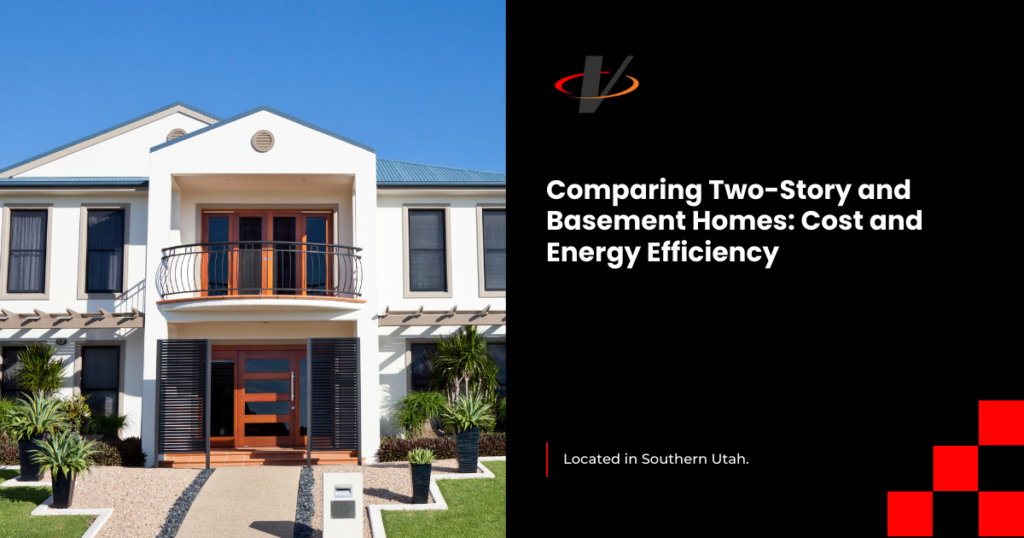
Comparing Two-Story and Basement Homes: Cost and Energy Efficiency
When choosing a home, one of the key considerations is whether to opt for a two-story or a basement home. Both options have their advantages and disadvantages in terms of cost and energy efficiency. This guide will help you understand the differences and make an informed decision that suits your lifestyle and budget.
Cost Considerations
Construction Costs:
Two-Story Homes:
Generally, two-story homes are more cost-effective to build on a per-square-foot basis. This is because they have a smaller footprint, requiring less foundation and roofing materials.
The vertical design can result in savings on land costs, especially in areas where land is expensive.
Forbes – Cost of Building a House (https://www.forbes.com/advisor/home-improvement/how-much-does-it-cost-to-build-a-house/)
Basement Homes:
Building a home with a basement can be more expensive due to the need for additional excavation, waterproofing, and structural support.
However, if you need extra living space, a basement can be more cost-effective than adding a second story, particularly if the cost of land is low.
HomeAdvisor – Basement Construction Costs (https://www.homeadvisor.com/cost/foundations/build-a-basement/)
Maintenance and Repairs:
Two-Story Homes:
Maintenance costs for two-story homes can be higher due to the need for exterior work at greater heights, such as painting and roof repairs.
Heating and cooling a two-story home can be more complex, potentially leading to higher maintenance costs for HVAC systems.
Basement Homes:
Basements may require additional maintenance to prevent and address issues such as moisture, mold, and flooding.
Waterproofing and drainage systems are essential, adding to the long-term maintenance costs.
Energy Efficiency
Heating and Cooling:
Two-Story Homes:
Two-story homes can be more challenging to heat and cool evenly. Heat rises, making the upper floors warmer and potentially causing uneven temperatures throughout the home.
Zoning systems in HVAC setups can help manage energy use more efficiently, though they can be an additional upfront cost.
Energy.gov – Zoning for HVAC (https://www.energy.gov/energysaver/zone-heating-and-cooling)
Basement Homes:
Basements generally maintain a more consistent temperature year-round due to being partially or fully underground. This can result in lower heating and cooling costs.
Proper insulation and ventilation are crucial to maximize energy efficiency and prevent moisture-related issues.
Department of Energy – Basement Insulation (https://www.energy.gov/energysaver/basement-insulation)
Natural Light:
Two-Story Homes:
Two-story homes typically have better access to natural light on both floors, reducing the need for artificial lighting during the day and contributing to energy savings.
Larger windows and higher elevation can enhance natural ventilation, improving indoor air quality and reducing reliance on air conditioning.
Basement Homes:
Basements often have limited access to natural light, which can increase the need for artificial lighting and affect energy consumption.
Egress windows and light wells can be installed to improve natural light penetration, though this adds to the construction cost.
Space Utilization
Two-Story Homes:
Two-story homes provide a clear separation between living and sleeping areas, which can be desirable for families.
The vertical layout can maximize the use of available land, leaving more outdoor space for yards and gardens.
Basement Homes:
Basements offer additional living space without increasing the home’s footprint, making them ideal for entertainment rooms, home offices, or guest suites.
The extra space can be versatile and used for storage, reducing clutter in the main living areas.
Conclusion
Deciding between a two-story and a basement home depends on your specific needs, budget, and the local climate. Two-story homes may offer cost savings in construction and better natural light, while basement homes can provide consistent temperatures and additional living space without expanding the home’s footprint. Consider the long-term maintenance, energy efficiency, and space utilization when making your choice.
References
Forbes – Cost of Building a House (https://www.forbes.com/advisor/home-improvement/how-much-does-it-cost-to-build-a-house/)
HomeAdvisor – Basement Construction Costs (https://www.homeadvisor.com/cost/foundations/build-a-basement/)
Energy.gov – Zoning for HVAC (https://www.energy.gov/energysaver/zone-heating-and-cooling)
Department of Energy – Basement Insulation (https://www.energy.gov/energysaver/basement-insulation)
By carefully considering these factors, you can choose the home type that best meets your needs for cost and energy efficiency, ensuring comfort and savings for years to come.
